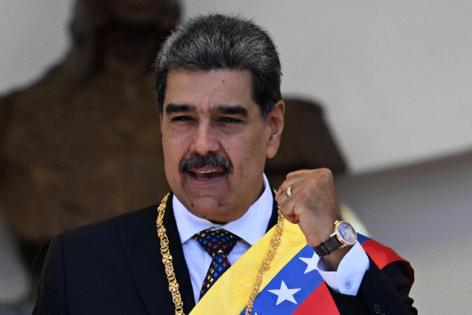Support grows in Venezuela for harsher sanctions against Maduro government, poll shows
Published in News & Features
As Nicolás Maduro clings to power following a widely disputed presidential election, desperation and fear are driving a growing number of Venezuelans to support harsher economic sanctions against his regime — even at the risk of crippling the country’s vital oil industry.
A previously undisclosed poll by U.S. firm ClearPath Strategies reveals increasing support for stronger international pressure to force Maduro from office. This shift comes as his government intensifies its crackdown on dissidents and opposition leaders, instilling fear among those who might otherwise take to the streets.
The change came after opposition leader Edmundo González, who most Venezuelans and a large number of countries believe was the real winner of last year’s presidential election, was unable to return to the country on Jan. 10 to be sworn in as president as he had pledged, citing that the threats against his life were just too serious to ignore.
According to the poll, two of three Venezuelans believe Maduro is occupying the presidency illegitimately, aligning with the opposition’s claim that González won the election by a two-to-one margin. Other surveys, conducted by telephone, suggest that up to 90% of Venezuelans believe Maduro rigged the election.
As Venezuela’s economic and political crisis deepens, the latest polling suggests a clear shift in public sentiment. With domestic protests now seen as too dangerous, many Venezuelans are looking to international sanctions and foreign intervention as their best hope for change, said David Bluestone, founder and partner of ClearPath Strategies.
The government crackdown on dissent following the unrest caused by the regime’s announcement that Maduro won the election led to the arrest of nearly 2,400 people, among them protesters, opposition leaders, journalists and human-rights activists.
At least 28 people were killed and 200 others were injured in the midst of the regime’s brutal repression. Human-rights organizations have reported that the actual number of deaths is much higher, claiming that some of the victims have died while subjected to spine-chilling forms of torture.
As that disillusionment and fear sets in, most people that are not chavistas — as the regime and its supporters are known — believe that any political change in the country will have to come from abroad, he said.
“Before the 10th of January, the number one thing people, excluding chavistas, said they would do to force the change of power was to take to the streets,” Bluestone said. “That number has fallen dramatically because people feel scared for their personal security. And in its place, we see a strong preference for the international community to intervene.”
The poll, based on 1,200 face-to-face interviews conducted in late February, showed that 73% of non-chavista Venezuelans are now in favor of the application of international sanctions against individual members of the regime and 59% in favor of sanctions against state-run Petróleos de Venezuela, PDVSA.
Only 20% of non chavistas are opposed to the sanctions on PDVSA.
The poll also found that the level of support for opposition top leader Maria Corina Machado has not diminished significantly among non chavistas despite the disillusionment triggered by the failure to remove Maduro from office, slightly falling to 72% from the 80% in the days prior to the July 28th election.
González’s support has fallen to 67% from 76% in the same period, while 60% believe he did all that could have been done.
While the approval for individual sanctions rate is in line with the numbers in the previous poll, conducted in November, the high number on PDVSA is a new development, Bluestone said.
“We have not seen this level of desperation for external support and pressure,” he said. Before this poll, answers to the question of what should be done to prompt political change in Venezuela tended to be spread between the need for international pressure and the need to search for an internal solution, he said.
“There is strong support for the Donald Trump administration, in particular, to take a more muscular approach towards the Maduro rule,” he said.
The poll was conducted amid news that the Trump administration had decided to revoke the license that allows Chevron to sell Venezuelan oil in the United States, giving the U.S. company until April 3rd to wind down its operations in the South American country.
The license, which had been awarded in November 2022 by the Biden administration, allowed the U.S. giant to produce about 220,000 barrels of oil per day out of Venezuela despite the ongoing U.S. sanctions, amounting to about 24% of the country’s current output of 900,000 barrels per day.
Chevron had an important part to play in Maduro’s designs to help the country’s ailing industry recover, given the company’s willingness to pick up the production slack of the trouble-ridden PDVSA and its role as the main gateway to the lucrative oil U.S. market.
Javier Coronado, a sanctions expert and partner at the international law firm Diaz Reus, noted that the Trump administration appears to have reverted to its “maximum pressure” policy on Maduro of Trump’s first term, despite initial signals that Chevron might be allowed to continue operating in Venezuela.
As a result, other international companies operating alongside Chevron may soon face a critical decision—whether to remain in the country, as their licenses could also be revoked.
“I believe this administration has been considering additional sanctions to intensify pressure, which is the ultimate goal of using sanctions as a policy tool,” Coronado said. “These businesses must assess the risks of staying in Venezuela, as violating sanctions carries not only civil penalties but also potential criminal consequences.”
©2025 Miami Herald. Visit at miamiherald.com. Distributed by Tribune Content Agency, LLC.







Comments